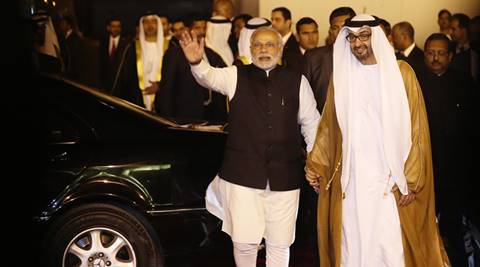Opinion Abu Dhabi calling
A strong partnership is taking shape between India and the UAE. It can change Delhi’s stakes and status in West Asia
 Prime Minister Narendra Modi shakes hands with Sheikh Mohammed bin Zayed Al Nahyan, Crown Prince of Abu Dhabi upon his arrival at Air Force station Palam, in New Delhi on Wednesday. Express Photo By Amit Mehra 11 Feb 2015
Prime Minister Narendra Modi shakes hands with Sheikh Mohammed bin Zayed Al Nahyan, Crown Prince of Abu Dhabi upon his arrival at Air Force station Palam, in New Delhi on Wednesday. Express Photo By Amit Mehra 11 Feb 2015  Prime Minister Narendra Modi with Sheikh Mohammed bin Zayed Al Nahyan, Crown Prince of Abu Dhabi upon his arrival at in New Delhi on Wednesday. (Source: Express Photo By Amit Mehra)
Prime Minister Narendra Modi with Sheikh Mohammed bin Zayed Al Nahyan, Crown Prince of Abu Dhabi upon his arrival at in New Delhi on Wednesday. (Source: Express Photo By Amit Mehra)
The United Arab Emirates (UAE) have turned into India’s gateway to West Asia, focusing New Delhi’s attention on an important region long neglected by Indian foreign policy, which now appears to be acquiring the geoeconomic and strategic priority it deserves. Abu Dhabi’s Crown Prince Sheikh Mohamed bin Zayed Al Nahyan’s visit last week built on the achievements of Prime Minister Narendra Modi’s trip to the UAE last August — the first by an Indian PM in over three decades, which had demonstrated India’s break from the past and recognition of the changed dynamics of the Middle East. The region’s altered security and politico-economic reality, not least because of threats like the Islamic State (IS) or the falling price of oil, necessitates new partnerships.
Although bilateral trade fell from its $73 billion peak in 2013 to $59bn in 2014-15, the UAE — which accounts for about 9 per cent of India’s crude imports — remains India’s third-largest trading partner and second-largest export destination, and has pledged to invest $75bn in India. Its $800bn sovereign wealth fund is a large resource pool from which investments can be made in infrastructure development in India — progress on these lines can be seen in Abu Dhabi’s interest in Indian highway projects. The joint production of defence equipment under the Make in India programme is another important area of focus. Mohamed bin Zayed’s visit also saw agreements, among other things, on cyberspace and cybercrime cooperation, space research, as well as collaboration on renewable energy. The MoU on currency swap between the RBI and Central Bank of UAE should ease bilateral financial transactions.
A significant aspect of bilateral ties today is the closer convergence on security and counter-terrorism. Notwithstanding a security agreement in place since 2011, progress on counter-terror and maritime security had been slow. But with the rise of the IS, the UAE took a strong stand against terror — and has, till date, deported about a dozen Indian citizens suspected of IS links. While enhanced security cooperation also ties in partly with the affairs of India’s 2.6 million large diaspora in the UAE, their problems had traditionally not received attention in Delhi. India’s six million workers in the Gulf contribute $50bn in annual remittances, but their work and living conditions need urgent redress. The PM had directly reached out to this community on his trip. Now, closer all-round bilateral cooperation should help address their concerns.





